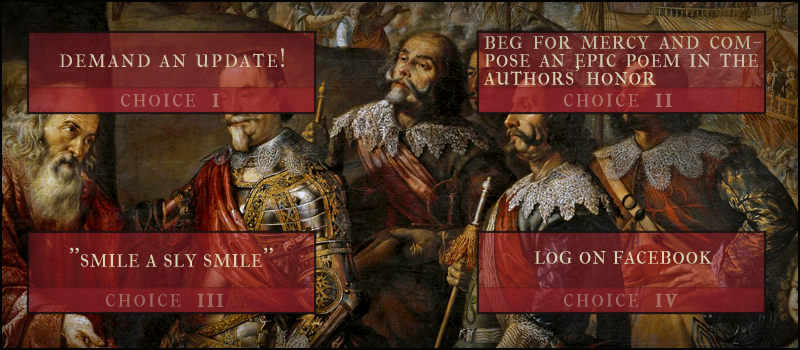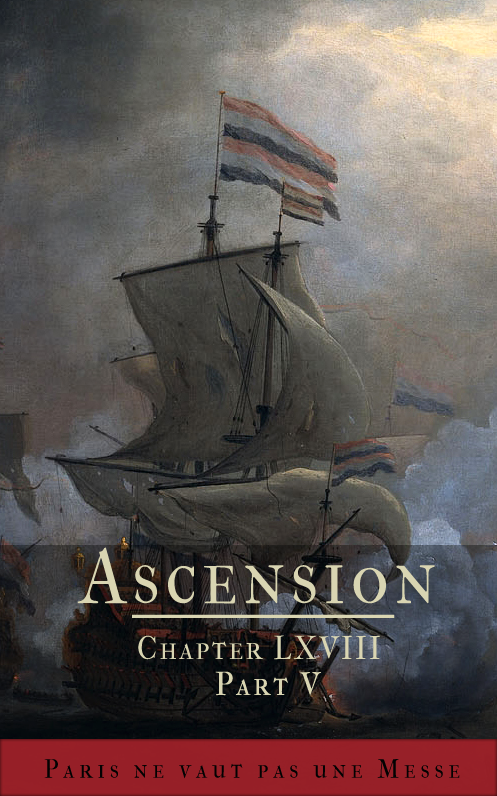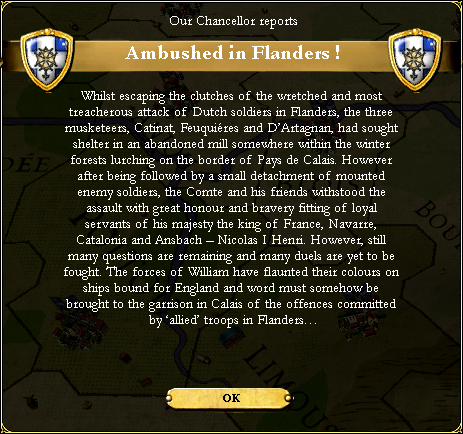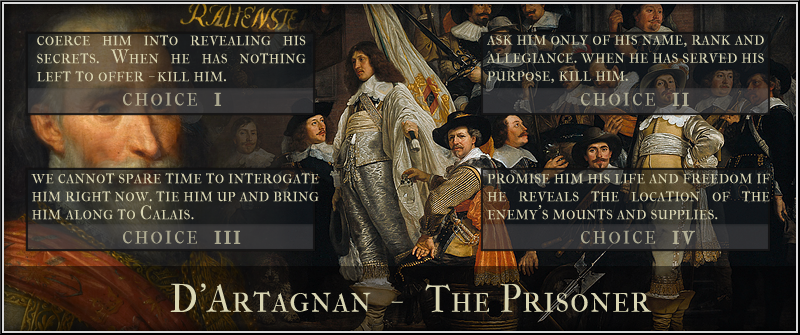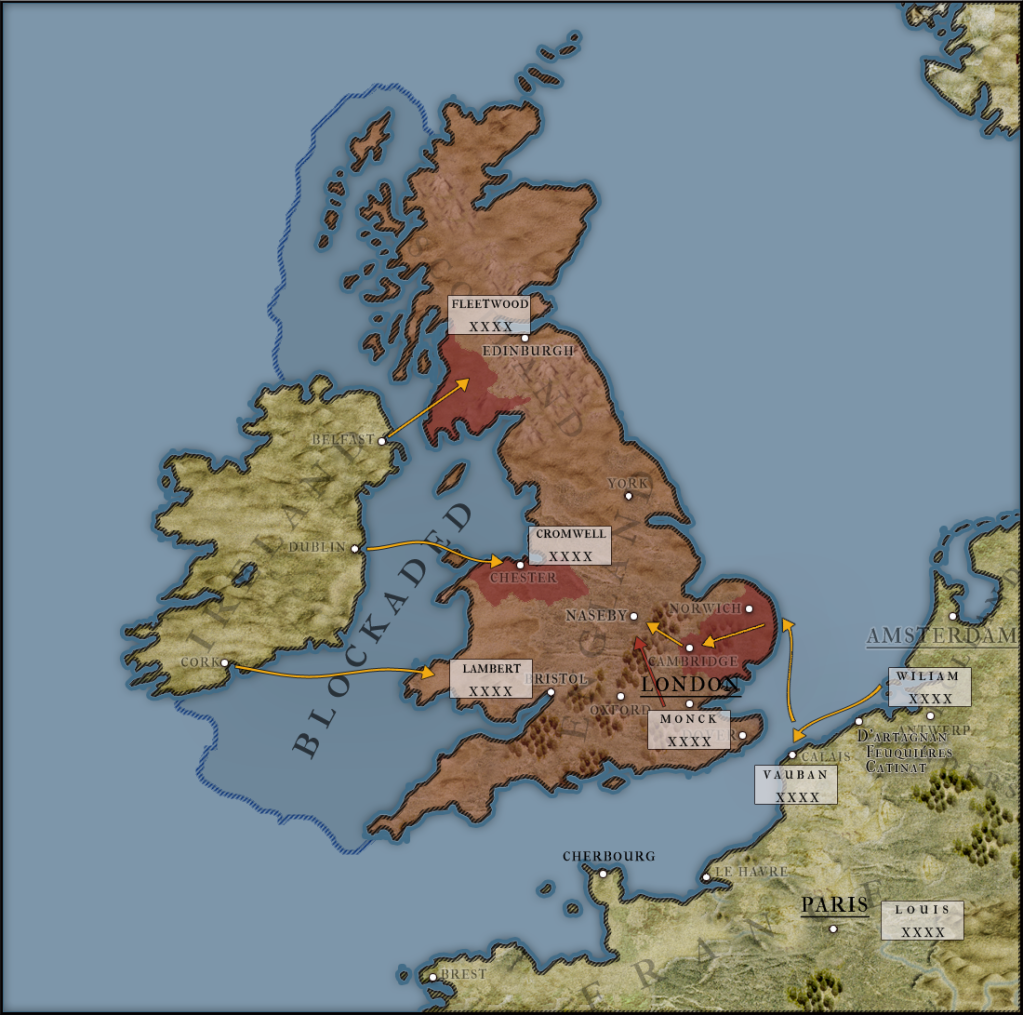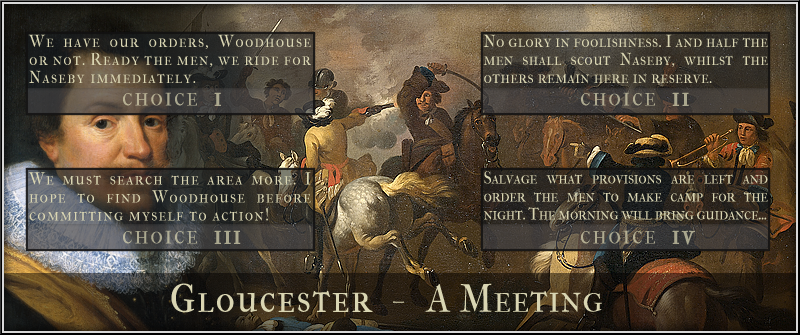PART V
We will not fear, for God hath willed
His truth to triumph through us
***
F L A N D E R S
3rd of January 1672
Catinat did not know just exactly they had escaped the encounter, but neither did he care much. Beside him, crouching for cover and swearing away in Breton, Feuquiéres was busy reloading his long-necked carbine. Evening was nearing and a dark-blue blanket was busy making its way over the frosty sky that spanned above. He could clearly smell the salty water of the channel beyond the dunes and the dead forest wherein their sanctuary was located.
They had ridden like devils with France before them and the Dutch behind… and had lost their way into this dark and menacing grove where an ancient ruined mill only just kept them safe from unknown bullets and the biting wind. However, it seemed as if the men of Oranje had also succeeded in getting lost – prying the same woods as they… like wolves after prey, the musketeer thought wryly.
The horses had died on them after some time, succumbing to the enemy’s gunfire and exhaustion alike after the daring getaway through the maiden white smoke of their three pistols. Poor shots, those Dutchs. As they rushed away with the Channel on their right, they had been able to keep track of the escadres of William for a long time, but by the time they swung towards the mainland, and into Pays de Calais, the fleet had disappeared out to sea.
Comte D’Artagnan turned his head abruptly from where it had rested upon the decaying walls towards the others. Like a cat aware of danger approaching, he slowly drew his sabre from its scabbard, conjuring in the emerging star light a long flow of silver… “They’re here.”
Feuquiéres sighed, twisted his torso slightly and, grounding one knee into the forest dirt, steadied his carbine on the low wall, taking careful aim at the edge of the tree line.
They heard low voices, rushed, uncertain and foreign voices amidst the crescendo of many branches being broken by armoured leather boots. The Comte took his pistol by the barrel in his left hand, keeping the sword ready and bare in the right and retreated into the encroaching shadows whilst Catinat himself watched the approaches with a pair of short cavalry pistols. His long and curly hair stroked against his unshaven chin and his vision was failing him despite the pursuers arriving with ignited torches.
There were two ways to enter the mill. One went through the broken and bare window which, was guarded by the kneeling Feuquiéres, whilst the other and more obvious was where Catinat stood erect with his muskets.
“
Fire.”
A flash lit up and disappeared to the echo of a resounding loud crack. Feuquiéres hit his man straight in a russet-coated chest and the attacker collapsed swiftly on the frozen ground with a loud yelp. Totalling half a dozen, the enemy troopers gave a cry of joy and rushed towards the entrenched French musketeers in high speed.
Two of them stormed towards Catinat, but as the first, a dragoon, raised his musket, the Huguenot took a step backwards and pulled both triggers simultaneously. The bullets broke the assailant’s left kneecap and he screamed in agony as he went down – discharging his weapon into heaven in the process. The other made an attack with his sabre, lunging forward in quick and determined moves. Catinat, expecting as much, responded by throwing his two, now useless weapons, straight into the Dutchman’s exposed groin.
The man faltered, dropped unto one knee and caught the iron covered butt of D’Artagnan’s pistol on his chin, with such a force that the stroke scattered broken teeth and blood all over the mill’s murky walls. The Comte swiftly bored his blade into the man’s throat and thereafter retreated into the mill one more time alongside Catinat.
Feuquiéres had downed one of the assailants, but two more were rushing for him. The musketeer swung his carbine around so that when the first of the Dutch attempted to climb the window he was ready to use it as a club. When the first of the Dutch plunged over the low wall and through the window, Feuquiéres battered the wooden butt with all his strength into the man’s exposed throat and the assailant’s charging cry became nothing more than a nauseating gurgle that died away in a stream of dark blood.
The last of their enemies, however, did not falter and had seemingly decided to go down fighting. With a dagger in his left hand and a long knife in the other, he fenced well and forced the musketeer to retreat into the mill spilling much of the Huguenot’s blood in the process.
Noting their companion’s distraught situation, D’Artagnan and Catinat left the bloodied entrance to aid Feuquiéres. The Comte made an abrupt advance, caught the enemy’s knife blade on his own guard and fell back a step before making an evasive action that wrested the blade from the Dutch’s hand, rendering him left with only a short dagger.
Nevertheless, their opponent commenced a renewed attack on Feuquiéres who swung his carbine once again, missed and caught the knife in the shoulder – where it remained.
As the Musketeer slowly collapsed on the floor, the knife protruding from his smattered cloak, D’Artagnan lunged forward and delivered a devastating slash towards the enemy’s torso whilst Catinat performed a ballestra and bored his own blade into the man’s right thigh. Groaning slightly the Dutchman recoiled from the vicious series of attacks and then fell sideways unto the floor.
With intense pain evident on every part of his face, Feuquiéres pulled out the knife from his shoulder.
“That… was an unpleasant way to start an evening,” he huffed in a strained way.
D’Artagnan searched the dead man’s uniform, but found nothing but meagre cobber coins, a set of dice – which he pocketed - and a small book in Dutch. Turning to his comrade he looked with concern at the big patch of blood expanding down the wounded musketeer’s travelling cloak.
“Those men were troopers, there’s regimental ensigns on the bastard’s coat… Same breed as those from the ambush I reckon…”
Feuquiéres exhaled heavily and, apparently struggling to focus his vision on the Comte, tried to undo the blue silken sash that was worn around his waist.
“We’re stranded in a black forest surrounded by foes and men of evil deeds and intentions...”
“Yet the closest of those, are now dead… or wounded” D’Artagnan added menacingly as a low moaning arose from the doorway.
“I completely forgot” Catinat added with misplaced humour, “…I always seem to do my work half-heartedly. I shall see to it, messieurs.”
Striding confidently with a hand on his sabre’s pummel and the travelling cloak tossed over one shoulder, the musketeer made for the wounded man who, without a doubt, was in far more pain than the wounded Huguenot… and likely to face even more quite suddenly.
“Don’t kill him” Feuquiéres hissed though clenched teeth. Although his face was a perfect mask of immense physical pain, the two dark eyes betrayed nothing of any emotion other than cold rationality. He blinked.
“I sincerely do not hope that you have gained any kind of love or mercy left for the men who tried to kill us all just a few minutes ago…” Catinat answered as he came struggling back into the mill’s centre, dragging the wounded man by his collar. “Yet if that is the case, your request is denied.” He added further emphasis to the last syllable by releasing the man from his gloved grip – making him drop unto his one good knee.
“Wait… ask him of their horses and munitions. Ask him how far we are from Calais… make him useful, Catinat… that’s all I ask of you. Don’t kill him.”
“….”
To D’Artagnan the prospect of indulging Feuquiéres seemed like an idea akin to treading along the path of a double edged sword. He craved answers. Both to satisfy his own curiosity as well as it would mean him having at least something to present to Marshal Vauban in Calais. He was after all still a musketeer and an official of the French state tasked with the gathering of intelligence. With a sigh, he cleaned the blood off his blade in the cloth of one of the fallen Dutch – making sure the live one saw it – and slowly walked towards Catinat and the wounded man… smiling.
Make one choice please.
***
What should have been a swift strike of opportunity against a regime that was losing its balance throughout its own home land, soon proved to be as far away from the original designs of the Parliamentarian-Orangist coalition as possible. Despite making the grand pincer movement of a naval invasion rather unharmed, the Royalist squadrons dared not face the Dutch fleet off Suffolk and in the Irish Sea they simply refused to leave port.
Not only did Cromwell and William fail to induce a majority of the pro-Stuart army to defect, although as mentioned above the navy in the Irish Sea remained at port in Bristol – refusing to engage the Parliamentarian squadrons, they also failed in securing some of the most vital cities on the Western coast for their cause.
Neither Bristol nor Edinburgh was taken by the forces of Parliament, rendering Cromwell with only a single secure base of operations in the form of the city of Chester on the Welsh border. However, despite these setbacks the invasion had progressed relatively impressively. Chester had had a large Royalist garrison – a testimony to the city’s latent show of allegiance – and it had fallen almost without a fight. The same had happened in the east where Norwich had surrendered to William after a few dull skirmishes, and her garrison had been only just a few companies smaller than that of Chester. As a consequence, the countryside of Norfolk fell under William’s authority, putting James in a tight spot. However, this was a situation better by far than the one the King would have found himself in, had Fleetwood and Lambert managed to overrun their respective sectors in Scotland and at the gates of Bristol.
After having garrisoned Norwich with trusted Dutch officers and a few battalions of mixed infantry, the Prince of Orange continued his advance towards Cambridge, another former Parliamentarian stronghold, where he ousted James’ loyalist commander before putting up headquarters. By then two weeks had passed and January 1672 was almost at an end.
Parliamentarians attempt to seize Bristol, to no avail.
James, sensing the danger of having to face a pair of enemy armies deploying from both the front and rear, declared his most able commander, George Monck the earl of Torrington, supreme commander of the Royalist army camping outside London proper and tasked him with marching for Cambridge so as to “… strike a deadly blow at the snake’s exposed neck.”
The King himself left London to take charge of the Western front and the Stuart sovereign put up his banner in Oxford, a city renowned throughout Europe for both its present devotion to James as well as its rigid defence of his father and father’s father. From here the Jacobin majesty, a term already in widespread use even before his succession, hoped to conduct a shielding campaign against Cromwell aimed at buying Monck enough to time to strike and defeat William in the field.
Without a pretender, he wisely concluded, the forces of Parliament would disintegrate and the invasion would have been successfully foiled.
It is not fair to say that battle solely was joined in the before mentioned theatres. Quite fierce fighting took place all over the realms of Scotland and England, albeit in a much smaller scale. Fearful of the envelopment and confinement of Edinburgh by the army under Fleetwood’s commission, the loyalists in the Scottish Highlands armed themselves and moved south in small bands engaging stray columns of Parliamentarian exiles as well as assaulting villages and communities not quick enough to proclaim their continued support for the House of Stuart. These ‘campaigns’ had, although savage enough, little impact on the larger War which would have to be decided further south.
Unfortunately, Monck did not prove able to counter or resist the advance of the Prince of Orange, but only managed to reflect his bold manoeuvres away from London and towards enemy encampments outside Chester. Still, the two armies kept a close yet detached game of hide and seek as they slowly but steadily pushed each other further and further east - neither one daring to be the first to throw down the glove in an open field battle.
However, this did not entirely play out to William’s advantage. For whilst Cromwell prepared his brigades in Wales and Lambert and Fleetwood rotted away in the trenches outside Edinburgh and Bristol, the King’s most promising new lieutenant and former aide-de-camp to Torrington, John Churchill, was rallying the great numbers of Stuart loyalists in Yorkshire. Hoping to raise an army that might intercept Cromwell before the “confederates of treason”, as the Prince of Orange and the Lieutenant General of Parliament were known collectively, had a chance to unite.
Although Churchill by then had not reached a meagre 22 years of age, he still commanded great authority in the north and through this unique seniority of respect and reverence, he planned to catch Henry Cromwell unprepared en route for the relief of the Dutch corps before joining Monck in an action against the invaders’ rear. With spirits high and much fanfare, the army of Churchill, compromising a few enlisted men and former veterans of campaigns against the Irish and Spanish, was organized into three and a half functioning brigades further divided in two regiments, and left York on the 15th of January aiming to occupy the land stretching between the Marches and Lincoln.
Thus four armies were closing in on each other from four corners of the Kingdom of England and they were all converging on the same village in sleepy Northamptonshire…
Naseby.
Movement of the armies of Parliament, William of Orange and the forces of General Monck, the earl of Torrington.
***
E N G L A N D
16th of January 1672
The men surrounding Gloucester did not like what they saw as he gave the order to halt with a raised palm. Reining in their horses, the men lined up around him in a disorderly fashion exchanging anxious looks. Some of them mumbled silent prayers for the dead men who lay scattered around a low knoll. They, alongside discarded weapons and equipment, left an all too evident impression of war on their minds.
Several of his men dismounted and began searching the corpses who were eerily illuminated by the lazy fire that had taken hold of a nearby cottage’s straw roof. Inside the burning shell of a house, several more bodies could be seen as shadows, suspended from the structure’s top beams. Gloucester felt his throat harden with grief as the skirts of the figures were caught by the flame and he demonstratively dismounted with a grunt.
Looking around the field he counted at least 50 dead and a broken and discharged cannon. One of its wheels had been smashed from the axle and the wide muzzle aimed hopelessly for the sky.
“Ours or theirs, O’Harra?” he made a rushed gesture towards the fallen as the Irishman came trudging back from the other side of the burning cottage. O’Harra gave him an uncomfortable look and shifted his weight from one armoured leg to another, the musket hanging on his back swaying gently in its shoulder strap.
“I’m sorry, milord… They all wear the ember coats of Sir Colonel Woodhouse’s regiment...” The Irish scoundrel looked at his superior and friend with meek understanding flowing from his cold eyes. “God is with us, sire. God is with us”, he said as he rested his arm on the cloaked shoulder of the duke. The gauntlet-covered hand weighed heavily on Gloucester’s shoulder and he repeated slowly the words of O’Harra…
“God is with us.”
His friend sighed heavily. It had been a massacre. Almost an entire company annihilated… and where was Woodhouse?
Turning away from the burning farm, the two men surveyed the field one more time before the duke called for the cornet to rally the men at the cannon. He did so without much joy thinking of his own family and friends of the neighbouring districts and the scores of fat columns of smoke rising from the horizon.
The company gathered as ordered around the cannon… the enlisted men looking worn out and ragged, some had even taken off their capelines whilst the officers with the cornet in the background whispered amongst themselves. Some of the scouts deployed by Gloucester and O’Harra to further search the area were returning with news of more dead soldiers loyal to the True Parliament of England. All of them had been wearing orange coats and green sashes - proof of their alignment with Colonel Sir Woodhouse, a man of great fame and ability who was also a close confidant of the duke.
With a tired gesture, Gloucester lead his horse a short stretch away from the men, followed by his four officers and eight ensigns.
“You all know the orders from General Cromwell…” He said with solemn dignity… “
Assemble your company and rendezvous with Sir Woodhouse and his brigade off Naseby. Be of as much assistance to his Majesty the Prince as possible. Engagement is feared to commence any day now.”
“A single company might not turn the table of the battle ahead, sire. Let us regroup with Lieutenant Edward Grey and make quarters for the night instead…” an Ensign attempted weakly.
“The General gave us strict instructions, sir” Another interjected with a fierce set of gestures. “You have seen what the cavaliers have done to the poor souls of one company, sir… battle might even already have been joined over the horizon. Do you not see the columns of smoke, sir!? Naseby is in flames.”
“We have no intelligence to…”
The second sneered condescendingly and pointed to the body of a young man laying close by, “There’s your intelligence, sir. They died for England, for the Faith, for Parliament and for your rightful sovereign…” and added, turning to Gloucester, “…sire, I beseech you. Listen to rugged council and lead the men towards the Prince of Orange and not towards cowardice and despair.”
Many of the officers nodded in approval. “Aye, sire, with this company here we could make hell a tad bit hotter for Torrington. Even if it would be for only a short bit”
Gloucester swallowed something of a mixture of anticipation and fear before raising his gloved hand to bring silence to his bickering officers...
Please make one selection.
Literal AAR homage of something of a double sided affair is included in this update. Be the first to spot it and win a Calvinist Cookie.


